In the midst of a turbulent few months for financial institutions, it’s time to take stock of recent regulatory announcements and consider how they are impacting businesses and he wider economy. Robert Bateman, Head of Content at GRC World Forums, talks to Amanda Wick, former FinCEN and DOJ attorney about the impact of President Biden’s recent executive order on Central Bank Digital Currencies (CBDC) and the challenges of regulation and enforcement.
Transcription
Leigh-Anne:
Hello. Hi everyone, welcome back. Thank you so much for joining us this afternoon at FinCrime Global. Just a quick reminder, you can register for additional sessions using the menu bar on your left, and you can view on demand even if you are not attending live. And please I’d encourage you to ask lots of questions to our panelists using the chat feature. Our next panel session is titled US Policy Developments and Their Impact On Cryptocurrency and CBDCs, which will be a fireside chat with Amanda Wick. Amanda, over to you.
Amanda Wick:
Good morning.
Robert Bateman:
Hello. So I’m hosting the session today. My name’s Robert Bateman. I’m head of content here at GRC World Forums. I’m joined by Amanda Wick, who is a former FinCEN and DOJ attorney. To introduce this session, US Policy Developments and Their Impact On Cryptocurrency and CBDCs. It’s been a turbulent few months for financial institutions, so it’s time to take stock of recent regulatory announcements and consider how they’re impacting businesses and the wider economy.
Robert Bateman:
We’re going to talk about Joe Biden’s recent executive order on central bank digital currencies and crypto, and the challenges of regulation and enforcement. As mentioned, I’m joined here by Amanda Wick. Amanda, before we get into our questions, could you please tell us a little bit about your expertise and experience in this area?
Amanda Wick:
Sure. I used to work at the Department of Justice as a federal prosecutor. I spent nearly a decade prosecuting money laundering and then specializing in crypto money laundering. As a result of that, I ended up going over to FinCEN, which is a bureau within the US Department of Treasury. And there, we looked at a lot of crypto policy, policy involving anti-human trafficking. And then after I left, I went to a company called Chainanalysis that makes blockchain analytics tools and does investigations for governments around the world. And then I came to the Hill. And so my background very unexpectedly turned to crypto in about 2012, 2013, I think. And ever since then we’ve been going down the rabbit hole of what it feels like, cryptocurrency and digital assets and everything else that’s come out since.
Robert Bateman:
Great. Thank you so much. So you’re very well placed to comments on this quite niche area then of cryptocurrency and digital assets regulations. I mentioned before the executive order from President Biden, the order on ensuring responsible development of digital assets, which was issued last month. Could we just outline the main points of the executive order, how it might impact on crypto, and also fundamentally what is a central bank digital currency and does America need one?
Amanda Wick:
There’s a lot in there so let’s think it the piece by piece. The first thing is I think the executive order on digital assets is best summarized by, its like I think of it in two parts. One part is the here’s everything that we’re instructing in terms of digital assets reports understanding, et cetera. And then there’s a very concentrated section on central backed digital currencies. And I don’t think that part was as surprising to many people because central backed digital currencies had been probably the larger point of discussion from a national security perspective.
Amanda Wick:
And what I mean by that is when we talk about cryptocurrencies, we’re talking about currencies that are based in cryptography, that’s where the name comes from. When we’re talking about central backed digital currencies, we’re literally talking about the digital form of a central backed currency. So like the dollar in your pocket, the ruble, the digital yuan, these are digital versions of their unit that then represents a unit that is backed by that country, that you could go, just like you could go in the US and turn in your dollar to the Federal Reserve and say, “This is worth a dollar,” the digital form of that.
Amanda Wick:
And there had been a lot of debate over whether the United States needed a central backed digital currency in order to compete with the digital yuan and the digital ruble. And I think there are some people who debate that today. I met an economist the other day who still is arguing vociferously that you don’t need a digital currency to compete with that and it’s not that the digital yuan and the digital ruble don’t actually threaten the hegemony of the US dollar. I think that’s a minority view. At a minimum, I think because there’s concern that the answer may be you do need to CBDC, that the executive order was really, I feel a push, a push to look into this, a push to research it, a push because, I don’t know if this is true for governments and other countries but at least in the United States, the natural tendency is to do nothing.
Amanda Wick:
The safest bet for bureaucrats is to do nothing and move nothing. And there’s less risk in that. I think the executive order was trying to say, do something, research it, make a decision, but don’t just sit here and wait. And I think that’s why you see a lot of reports from tons of different agencies, like look at this, analyze this, get on top of this, because I think US government as a whole needed a little bit of a fire lit under it for people to say, this is not a fad. You need to start learning this. You need to start researching this. You need to start having answers for the questions to what do we need.
Amanda Wick:
And I’ll just say that the title, I think people missed a really important thing about it is that it was the executive order on ensuring responsible development of digital assets. And that word responsible is hugely important.
Robert Bateman:
To put this in context, we’ve had a series of pretty high profile crypto breaches recently. Just last week, in fact, we learned of what may be the biggest crypto hack to date involving the apparent theft of around $617 million worth of Ether and a Stablecoin called USD coin from the Ronin network. Amanda, is there any connection between these incidents and Biden’s executive order? Are there any other factors that could explain why the president has delivered this executive order now?
Amanda Wick:
Well, obviously, the Ronin incident wasn’t the first and there have been a lot of security issues with some of the exchanges, with some of the projects. Somebody threw in the questions the issue of lots of different cryptocurrencies. And sometimes people are surprised that there are thousands of cryptocurrencies and you can start one tomorrow and start selling tokens.
Amanda Wick:
I do think the timing was such that you had a conflation of two things. One was the risk of cyber security incidents. And so last year you had the executive order on cyber security, and then you had the executive order on digital assets. I don’t think those things are completely unrelated because what you see in digital assets is a lot of personal autonomy. One of the things that people love about cryptocurrency is the idea that you can control your own money.
Amanda Wick:
You can have a unhosted private wallet that you carry around and there’s huge use cases for that. But with personal autonomy comes a massive amount of responsibility. And in other areas of finance, we have a lot of regulation around what you have to tell people, the instructions and the warnings that you have to give, the security that you need to have around assets.
Amanda Wick:
And right now in digital assets, I don’t believe you don’t have the same regulations and you don’t have the same clarity of regulations where in traditional finance, there is I believe a lot more safety, security and controls. And that’s a problem because you don’t want investors losing hundreds of millions of dollars. And these just tend to get bigger and worse. And so I don’t think the order was timed with any incident per se, but I do think you have a series of incidences that made it especially obvious to the administration that something was necessary because right now you have a huge amount of risk. You have a huge amount of risk that isn’t being address by government agencies.
Robert Bateman:
So a side question then on that, there’s this tension with cryptocurrency and the consumer or financial sector increasingly using these sorts of assets, between maintaining the stated original purpose of these instruments, providing anonymity and privacy in transactions and autonomy like you say, and mitigating the risk associated with them. Do you have a view on this? Will this kind of regulatory action be more likely to harm or support the development of Bitcoin and other cryptocurrencies?
Amanda Wick:
Well, right now, I think right now the question that everybody in policy, especially looking at digital assets policy, I think the question that people are trying to ask is how do we regulate this to basically strike a balance between the needs of AML and CFT, to make sure that criminals aren’t using it, that it’s not financing terrorism and then also to enable innovation. Because we can make use cases, we can make arguments for why this is helpful, why this is necessary, but we also don’t want to allow the anonymous free flow of money.
Amanda Wick:
And to your point about the privacy, that’s a really big concern because when people see, especially publicly available blockchains, the breadth of transactions that you can see, when you tie that to identities, that is a lot of information and a lot of financial data. We can’t have a conversation about how to regulate crypto or how to regulate digital assets, excuse me, without having a discussion about, well, how do you protect digital identity? How do you protect identity so that there’s not some massive honey pot somewhere of all these people’s financial activity tied to their identity? And part of the problem there is that’s a technological discussion. Somebody asked a question about central bank crypto discussions in the US, are they only as a digital form of current value? Are there discussions-
Robert Bateman:
Sorry, this is one of the audience questions. We’re getting quite a few of these so let me bring one in now, which number is this you’re referring to there?
→ SEE ALSO: FinCrime World Forum
Part of the Digital Trust Europe Series - will take place through May, June & July 2022, visiting five major cities;
Brussels | Stockholm | London | Dublin | Amsterdam
Get to the edge of the financial crime debate at FinCrime World Forum.
Amanda Wick:
This is the Q3.
Robert Bateman:
Yeah. So let me just put this to you then as part of this, where we’re at in the conversation. Central bank crypto discussions in the USA, only as a digital form of the current, I guess that means dollar, other discussions about a new kind of entity with a new infrastructure of new digital tools, new rules, but how to set value for these. I don’t know what you make of that question, Amanda, please go on there. You’re about to address it.
Amanda Wick:
Yeah, because I think it’s a really good question in that, and sometimes it’s the nature of these discussions to oversimplify things. And it’s a really good catch because the conversation about central backed digital currencies isn’t just about, should there be just a digital form of the dollar? Because you have companies like Circle who have Stablecoins and it may be that a central backed digital currency has aspects of that, or there may be technological issues that people haven’t thought of. So to this person’s point, if we were to have a central backed digital currency, what would that look like? Would it just be a new iteration of the dollar, or would there be aspects of the digital dollar? Would there need to be new rules? Because what we see as a huge problem in the United States is the Bank Secrecy Act that we’ve had since 1970 was written for cash.
Amanda Wick:
If your entire regulatory framework is written for a completely different analog tool, do you have to rethink the entire concept of your regulatory policy in order to not be shoving a square peg into a round hole? And that person’s question reflects one of the problems that we’re having is that it’s a complicated question because we have to sit down and think, “Well, what is the technology? And should we stick with what we have, or should we sit down and draft new?”
Amanda Wick:
And part of the clash is you’ve got a lot of people, entrepreneurs, private sector members, people who have a lot of input on the technology side, and then I can tell you as a former bureaucrat, you’ve got a lot of bureaucrats who aren’t necessarily sitting there saying, “Well, what’s the next cutting edge thing that we can do in technology?” They tend to be Luddites who very much don’t want to change the rules and change the laws and that up a huge problem, because what we’re entering, when you look at Web3, and I don’t want to go down too many rabbit holes, but we’re entering an age of digital finance.
Amanda Wick:
And the more that we try to shove the age of digital finance into an analog age of rules that were made for a completely different technology, the more problem we’re going to have. I think the hope of the executive order, taking it back to the point of the executive order, was we need people to start thinking about this creatively. We need people to start looking across these agencies, tons of different agencies that were in the executive order to be thinking about how do we do this? It’s 2022, how do we move into digital finance as a country? And people have not been thinking about this and especially in US government, they need to.
Robert Bateman:
So as I say, we’re getting lots of questions in here. Let’s just stay with the executive order for a little bit longer, then I’ll bring in some of these audience questions. The order obviously essentially is addressed to various government agencies to ask them to come up with new solutions to these problems as you say effectively. What are the impacts on perhaps other state holders, the cryptocurrency exchanges? I know anecdotally, I think it was Coinbase is engaging in more diligence, KYC type actions from its customers. Do you think that there’s going to be an indirect impact on any other stakeholders? What’s the most important thing about this executive order outside of government agencies you think?
Amanda Wick:
No, I think it’s going to have a huge impact. I was reading an article yesterday about how Binance and FTX are already looking into licenses and are trying to become more regulated, which you is huge. As somebody who used to work for a blockchain analytics company that did lots of reports on illicit funds, Binance and Phobia are the top two exchanges that have the most amount of illicit funds running through them. And when you don’t have a jurisdiction and when you’re not trying to comply with regulations, that’s a huge problem when you’re operating, I think billions of dollars of trades per day. The fact that these massive major companies are now starting to acknowledge, I think the title of the article is something like It’s Time to Pay Caesar, but the idea that crypto has been going for over 10 years, I think at least 10 years, and now some of these companies are just starting to acknowledge regulations, acknowledge the obligation to have AML, KYC due diligence programs.
Amanda Wick:
That’s really critical because on one hand enforcement is absolutely necessary. And I think some people wish and would like to see more enforcement actions. Recently, you may have seen the National Cryptocurrency Enforcement team are the INSET was set up by the Department of Justice. And I believe there’s a lot of hope that that team is going to bring some major enforcement actions against crypto exchanges that are pretty much known money launderers and if they’re not going to straighten up and fly right, they need to have enforcement actions brought.
Amanda Wick:
But at the same time, there’s not enough resources to enforce our way out of that. The group at FinCEN for civil enforcement, tiny. The group at DOJ, not big enough to patrol an entire industry. You have to have some aspect of self-regulation. And I think the executive order kind of signaled to exchanges, it’s time to do this yourselves before there’s a wave of enforcement coming. And so I do think we are starting to see a number of exchanges and Coinbase had done this years ago. I think they were one of the first to say, “We’re going to do this right and we’re going to do this heavily.” And you saw the reward for that be the direct listing and them having, I believe a much smoother path in the United States in any other exchange.
Amanda Wick:
And you saw that with multiple exchanges, Gemini, there’s a number of exchanges that leaned in and said, “We’re going to invest the money to do this right.” There were a number of exchanges that took their chances and didn’t, and I believe those ones are now reconsidering and saying, “Hey, we’re going to kind of start complying with regulations before enforcement comes after this.”
Amanda Wick:
And so I think to your point, yes, I do think you’re going to see this as like a sign to exchanges, like don’t wait for us to come after you be proactive about picking a jurisdiction and getting compliant with their AML rules.
Robert Bateman:
Okay. I name checked the wrong exchange though, the big ones have been doing this more conventional KYC and AML practices for some time. Do you think this might be a wake up call for the rest of the industry and they’ll start coming under a specific jurisdiction and expecting to be regulated more heavily than previously going forward? Just one last question about the executive order then before we move on to some audience questions, what’s in the executive order that surprised you? And is there anything that you didn’t see there that you expected to see? What was surprising for you, what was in there and what was omitted perhaps that you expected?
Amanda Wick:
I think that the thing that was surprising was how comprehensive it was and surprising in a good way. I think there had been a tendency in the United States when people said crypto, or even central back digital currency to think, “Oh, okay, well, that’s the SEC or the CFTC or the Federal Banking Associations.” I think there was a very narrow aperture in terms of what people thought in terms of the agencies that needed to look at this or how this impacted things. And I think one of the things that was super impressive about the executive order, and I know some of the brilliant minds who wrote it, but the breadth which they tried to address to say, “There are a lot of agencies that need to be looking at this. There’s lots of different issues that come into play with digital assets.”
Amanda Wick:
And actually one of the people, I’m going to incorporate one of the questions because it’s a really good moment. Somebody asked from an ESG perspective, environmental, social, and governments. I always have to remind myself what it stands for. But with respect to the E component, challenges there when considering digital currencies, cryptocurrencies, you see in the news all the time, the energy usage of crypto. And that was something that the executive order talked about and the need to examine that. Because if we have a conversation in a bubble about digital assets and we don’t look at the environmental ramifications, you’re going to have one agency weighing in and then years later the EPA saying, “Well, they should have called us.” And that’s what you don’t want. I think the most surprising thing in a really good way was that somebody really took time and effort to comprehensively say and call out these agencies and say, “I know you think you may not need to know anything about digital assets, but you actually do and we need you to weigh in on this for it to be a robust, comprehensive plan.”
Amanda Wick:
I think the thing that was disappointing, and this is just from my perspective is that there was nothing that talked about the urgency of funding and resources for these agencies. I think one of the things that’s frustrating and I beat this drum and sometimes I sound like I’m beating a dead horse, so if you’ve heard me say this before, apologies, but I tend to say it at every opportunity I get. It’s so easy to say, “Write a report.” It’s so easy to say, “Analyze this.” And people have a tendency to forget they have a day job. They are literally running the nation’s government. And when you load reports onto already overworked, under resourced, understaffed agencies, and in the United States, we’ve had a lot of constriction of government through attrition and just through policies, there’s not a ton of people doing this work.
Amanda Wick:
There’s not a lot of resources to do it. You’ve put a big, giant burden that’s necessary on a bunch of people who are already burdened. And so the fact that there wasn’t a discussion about frankly, appropriations being necessary and what Congress could do to help, that was something surprising. And understandably, maybe the executive order felt it wasn’t its place to say what Congress should do, but something in there about needing funds to accomplish this would’ve been a good heads up to Congress.
Robert Bateman:
Great. Well, that covers one other question I was going to ask about the challenges of enforcement for these agencies. Do you think that’s fundamentally a question of resources then for meaningful regulation of crypto, do those agencies simply need more money?
Amanda Wick:
For some agencies absolutely. With FinCEN, a hundred percent. And you can see that because they are bringing enforcement actions, just probably not as many as they could. With DOJ, I would not say that. I would say there’s been just a lack of, in some sections, and I think this is the benefit of INSET, is that where the responsibility for bringing those cases was located, there just wasn’t a will to move some of those cases. There have been investigations there for a while that have not moved. And so I think what a lot of people are hoping with INSET is that now that you have in the Department of Justice the office of the deputy assistant, the Deputy Attorney General, or ODAG as we call it, now that you have direct view, direct oversight, the hope is that with people looking at this, there will be will to move some of these investigations in these cases forward.
Amanda Wick:
And so for some agencies it’s resources, but for some of them it’s frankly the will to get out there and take a position and bring a case because especially for the Department of Justice in the United States, the bar for cases, criminal enforcement is much higher than civil enforcement. The burden of proof for criminal cases, much higher. So those tend to be far more difficult, take a lot more approvals. And so getting those cases pushed through the system is a lot harder than it is at like a bureau like FinCEN where it’s civil and it’s often a cleaner path if you will. But I think a lot of us are frankly watching, waiting, and hoping that INSET is going to bring a lot of the enforcement actions that the unit that had been responsible for them, frankly, just wasn’t bringing for the last few years.
Robert Bateman:
On a related note, a rather loaded but probably fair enough question here from an audience member. Given your experience in the public and private sectors, to what degree will Congress be a hindrance, I suppose, in passing these new rules and regulations, especially when considering data and tech illiteracy, partisanship, and special interest lobbying? Any views on that, Amanda? Will Congress, will we be able to see meaningful primary legislation about this thing given the state of Congress?
Amanda Wick:
That is such a fantastic question. And it’s so well written I have to say. It covers all of the points. I will say I’m here in my personal capacity, so I don’t speak on behalf of any member of Congress or any committee, but I will say that that is something that everybody is very concerned about right now. Having said that, I will say it’s a very double edged sword. You have some folks on the Hill who are working in these offices who are very literate, and they are basically evangelists to other folks on the Hill who are not. There’s absolutely special interest lobbying groups and ever since in DC COVID rules have lifted a bit. And so you’ve seen a lot more get togethers, a lot more happy hours, a lot more networking from the crypto lobbying associations. But the conversations are happening.
Amanda Wick:
I was at an event a week ago where it was a fantastic mix of people talking about just this topic. And the biggest thing that we talked about was the need for education. To the point of data tech illiteracy, that is a huge problem. I will tell you the other problem that is a problem specific to US Congress. And I don’t want to say problem, but it’s a unique aspect. I am ancient on the Hill. Our laws are written largely by 24 year olds to 27 year olds who work in the highest levels of US Congress. And it’s a little shocking sometimes how young a lot of people on the Hill are. And it’s not a bad thing per se, but when you’re talking to somebody who doesn’t know what dial-up is, and their frame of reference is different, their entire world view is different.
Amanda Wick:
And so it’s just very interesting to have these conversations with an entire generation that doesn’t know a world without smartphones. And so there’s huge pluses and there’s some minuses to that because then you also have Congress people who are 70 or 80 who have their staff sending out emails for them. So there’s a lot of dynamics on the Hill that are very unique. I will say one of the really interesting and encouraging things is that all of these events, they tend to be very bipartisan. There tend to be people from both sides of the aisle, maybe not agreeing on anything outside of digital assets and there’s a little bit of a truth waved on any other topic. But when it comes to digital assets and the future of digital finance, there seems to be, especially after the executive order, an acknowledgement that it is so critical that we do this correctly and that we get this right.
Amanda Wick:
And if we don’t get it right, that is something that could be really bad for both parties. And so I do think that yes, partisanship is a risk. I think one of the actual biggest risks is the nature of having 50 states, lots of different representatives, lots of different senators, because this is a national issue. And to the extent that you have people who try to make it a, “Well, this needs to be based here, or this state has this interest.” And if we don’t look at it as a we problem and not a me problem, then we will get it wrong.
Amanda Wick:
I think the risk isn’t partisanship per se, although that’s always a toxic element when it comes to Congress, but the risk that we don’t look at the greater good, or we let perfect be the enemy of the good, or we move too slowly or conversely too quickly, which I know is basically everything. And it’s sounds like I’m saying we should just do this perfectly, do it. But I do think the conversations that we’re having are basically kind of like, okay, how do we make the sausage and how do we get it right? And most importantly, how do we get responsible innovation now?
Robert Bateman:
Great. A slightly technical question here from the audience, why do we need a central backed digital currency when the whole point of blockchain is zero trust security? You able to address that, Amanda?
Amanda Wick:
Yeah, that’s a really good question. I get that question a lot, usually followed by isn’t cryptocurrency just a giant Ponzi scheme? And people laugh, but at the same time, it’s a very weird concept that we have this alternate form of money and people are like, “That’s just so weird. Why do need that?” And there’s two schools of thought in the sense that we have the US dollar. And then we also have alternate forms of value, and we have other systems and we have other markets. And those other markets are important. A lot of people look at Bitcoin, especially Bitcoin, specifically as just an alternate hedge, like an alternate investment like gold. It’s a concept of, if you believe that people want an alternate means to exchange value that’s outside of the traditional financial system, like gold, a digital asset that’s exchanged in that way that’s just based on supply and demand isn’t an unreasonable investment.
Amanda Wick:
And as long as people believe it has value, it does. And people say to me, “Well, that’s crazy because it doesn’t have value.” And I’m like, “Trust me, somewhere in your life there’s a woman you know who has a purse that costs probably about $50 to make, but they bought for $10,000 because of letters stamped or colors on it that indicated that it had some value.” And I’m being a little tongue in cheek there and Rob, your smile suggests that you may have that woman in your life, but we are very comfortable, especially in the idea of luxury goods with the idea of demand driving cost. And we see this all the time. Limited supply, great demand. You pay $10,000 for a purse that costs a hundred dollars to make. Nobody objects to that.
Amanda Wick:
That’s the concept of some of these cryptocurrencies. And when you look at a central backed digital currency, yes, we might have the ability to tweak tools and we would have the ability to affect it just like monetary policy, just like we would for a non-digital central backed currency. But the fact that people wanted an alternative reflects that not everybody trusts the state sponsored financial system. And I don’t know that there has to be an either or. We have alternative markets, we have alternative investments and alternative assets. The key is that just like we have the stock market, it’s regulated, it’s monitored. It has protections for people in place who are going to invest. We only let certain people invest in certain things. We have warnings before they invest. So when you talk about the consumer protection aspect of those alternative assets, it’s already there for traditional finance in a way that it really hasn’t been for crypto.
Amanda Wick:
And that’s why some people say like, “Look, it just needs to be equal. You can have these alternative assets, just treat them equally, just protect people, just make sure people know, hey, these are the risks if you’re going to invest in this alternative asset.” But I don’t think it’s an either or. I think the discussion about central backed digital currencies and whether we need that for national security purposes to compete with the digital yuan and the digital ruble is completely separate from the question of, do people see value in Bitcoin and cryptocurrencies as an alternative investment or as an alternative payment rail system just in case some of these governments don’t go the way that people think. A hedge.
Robert Bateman:
The handbag analogy is quite reasonable. I thought this was an Adam Smith quote, but apparently it’s attributable to a Roman writer whose name I can’t pronounce. Everything is worth what it’s purchaser will pay for it. The value is in the sort of it’s assigned by the people buying it. And as long as people keep buying it, then it will be a store of value in that way, irrespective of the other potential problems with crypto. And we touched upon the environmental issues, for example, that do need to be taken into account of course.
Robert Bateman:
Strong feelings are on both sides of this debate of course. And I did want to just touch upon this question here. I don’t know how much you know about the situation outside of the US, but I’ll go ahead and ask the question. Is the US joined up with the EU and the UK in its approach to CBDC Stablecoins or crypto in general? The UK, the questionnaire adds, announced a similar initiative to Biden’s executive order yesterday, for example. Do you know about this international state of play here, Amanda, whether the US is aligned with other Western economies on this?
Amanda Wick:
Yeah, so I can’t speak to specifics in terms of conversations, but I do know both from my time at FinCEN and also talking to others who have been there since, there’s a lot of conversations that the financial intelligence units or the FIUs of each country have with each other. And I do think that there are a lot of productive conversations being had. I think some countries were a little bit, I think Singapore, Malta, there were some countries that were a little bit willing to lean out a little earlier on certain issues. And then I do think a lot of the international community was looking to the United States to see what they did, which was another reason why the executive order was really important. I think it probably wasn’t a coincidence that the UK’s initiative was similar and came out relatively soon.
Amanda Wick:
I think these countries do talk to each other. I know some of the countries talk to each other more so than others, but I also think that’s why programs like FATF, the Financial Action Task Force, I’m terrible with acronyms, but I’m like 99% sure that’s what it stands for at 8:30 on a Tuesday morning, you’re just going to have to take my word that that’s what FATF stands for. But those meetings and those discussions and the international aspect of this, I think that’s what crypto has really pointed out to a lot of financial regulators around the world is people had a tendency to really think that money was siloed. And what crypto did was make it really clear that no, you can have the instant transfer of digital funds to somebody anywhere in the world. And we have that with technology, but I don’t think it really hit people.
Amanda Wick:
And when you see it, when people talk to each other and transfer money instantly, massive amounts of money instantly to somebody on the other part of the planet that could largely be completely unregulated, that’s something that’s very difficult for people to wrap their minds around is that we now have the technological capacity for individuals to transfer money to each other outside of traditional payment rails. What do we do about that? And the answer there to, what do we do about that as a world, as a globe, as a human race requires a lot more discussion and a lot more collaboration than each of us having central backed currencies, where we had our own monetary policy, where we had our own AML programs and, oh, this country was doing this and this country was doing this and it was fine.
Amanda Wick:
But when you have the money that can move globally instantly, those conversations have to get a lot more collaborative. And I think you see that in these discussions in countries talking to each other and with the essentialness of FATF and organizations like that and how important they’re going to be to ensuring that we get it right.
Robert Bateman:
Good. I will post my last question to you now then, Amanda, in these last five minutes before handing back to Leigh-Anne. I’m going to take one of these audience questions and broaden it out slightly. So the viewer asks if there have been any discussions that you know of about the need for a license from the Feds to issue various cryptos? Do you think that’s on the horizon and if not, or additionally, what else happens next after this executive order? What do you see as the future in this space? If you could give us a few pointers there.
Amanda Wick:
I think that’s exactly what the executive order was trying to address is the need for these discussions to happen into terms of, do there need to be licenses? If so, who needs to issue these licenses? We have multiple federal banking associations in the United States. Should there be one agency to regulate crypto? If it’s not a security, it shouldn’t be the SEC. If it’s not a commodity, it shouldn’t be the CFTC. So there’s a oversimplification to the fact that when people say, “Well, which agency is going to do what?” It’s like, do we have an agency right now that can even sufficiently address this? For cyber, they created at entire new office, I think the Director of Cybersecurity, I’m butchering that, but the cybersecurity literally created an entire new office that’s looking at this holistically and there may need to be something like that, like a crypto czar basically.
Amanda Wick:
And the executive order didn’t order that, but in its request that these agencies look at this and the report timeline’s super truncated. I doubt a single agency is going to be able to get their report in on time given those timelines. I wouldn’t be surprised if those agencies just blow through those deadlines. There’s no report deadline penalty, unfortunately. But when these reports do start coming in, then I think you’re going to start to see, okay, then what do we do next? What’s the next step? And in the meantime, I think there’s a lot of conversations happening about what is the next step when we start wrapping our heads around this, because we can’t just put out this executive order and then not move. There has to be some plan. There has to be okay, what agency is going to do what?
Amanda Wick:
What is the Fed going to do? What is the SEC going to do? What are we going to do about all of the various cryptos? Part of the problem is that right now, the question of manage responsibly innovating in digital assets is a little bit trying to eat an elephant. And we had this saying when I was a prosecutor, how do you eat an elephant? One bite at a time. Because if you try to eat the entire thing, if you try to solve the entire problem of digital assets, if you try to sit down and say, “Well, what are we going to do about CBDCs? What are we going to do about crypto? Who’s going to…” If you try to do all of it, it’s very difficult. I think I would anticipate seeing pieces taken at a time, CBDCs being addressed crypto, maybe consumer protection, little bits at a time to wrap our heads around the problem that is responsibly regulating digital assets.
Robert Bateman:
Well, Amanda, thank you so much. We’ve had some great feedback here from the audience. It is a privilege to have someone with such great insights and practical experience in this space from both public and the private perspective. And I feel we’ve addressed quite a few audience questions here, because there were a lot, so we managed to get through as many of those as we could. Apologies if we didn’t get to yours. Again, thank you so much for your time, Amanda, it’s been a real insight into what’s happening in this very fast moving and confusing at times this space, but it’s fantastic to have your insights.
Amanda Wick:
Yeah, it’s always a pleasure to talk with you, Rob.
Robert Bateman:
Thanks, Amanda. I’ll hand back to Leanne now.
Leigh-Anne:
Thank you so much. Thank you, Robert. And thank you so much, Amanda. That was such a hugely interesting session on crypto and digital assets. Thank you so much for sharing your insights with everyone. Okay, so stay tuned, we’re going to take a break for 15 minutes and then we are going to rejoin to discuss utilizing automation, AI data, and machine learning to fight financial crimes more effectively and take a look at what’s on the horizon for 2022.
FinCrime World Forum
Part of the Digital Trust Europe Series - will take place through May, June & July 2022, visiting five major cities;
Brussels | Stockholm | London | Dublin | Amsterdam
Get to the edge of the financial crime debate at FinCrime World Forum.
FinCrime World Forum is a two-day in-person event taking place as part of the Digital Trust Europe series. The event will feature presentations and panels from thought-leaders and anti-financial crime professionals that are leading the way on how we can better, more efficiently and more effectively fight financial crime.

US Policy Developments and their Impact on Cryptocurrency and CBDCs

Robert Bateman, Head of Content at GRC World Forums, talks to Amanda Wick, former FinCEN and DOJ attorney about the impact of President Biden’s recent executive order on Central Bank Digital Currencies (CBDC) and the challenges of regulation and enforcement.
 Currently
reading
Currently
reading
US Policy Developments and their Impact on Cryptocurrency and CBDCs
- 2
- 3








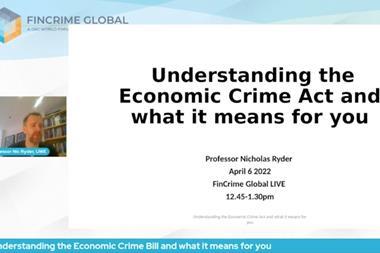
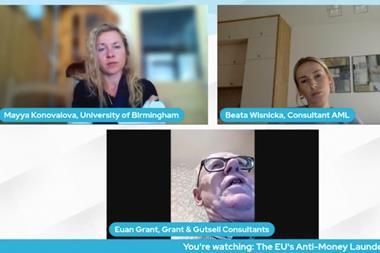
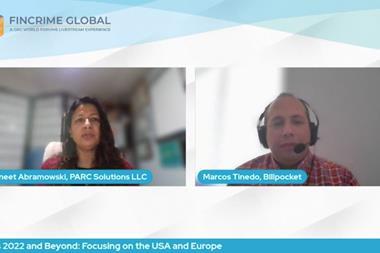

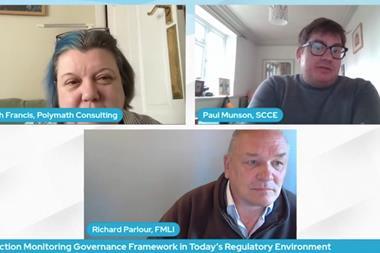






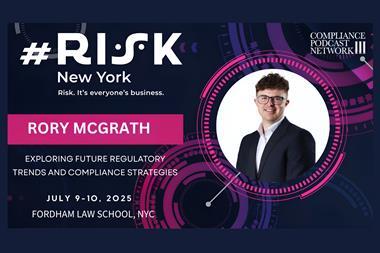
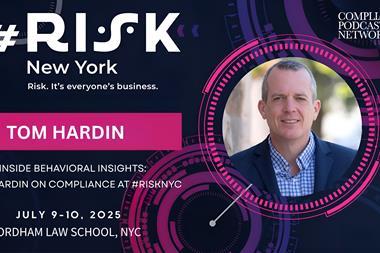







No comments yet